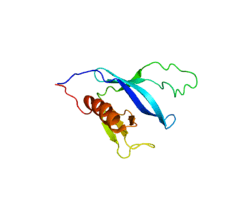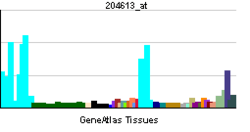PLCG2
| View/Edit Human | View/Edit Mouse |
1-Phosphatidylinositol-4,5-bisphosphate phosphodiesterase gamma-2 is an enzyme that in humans is encoded by the PLCG2 gene.[4][5]
Function
Enzymes of the phospholipase C family catalyze the hydrolysis of phospholipids to yield diacylglycerols and water-soluble phosphorylated derivatives of the lipid head groups. A number of these enzymes have specificity for phosphoinositides. Of the phosphoinositide-specific phospholipase C enzymes, C-beta is regulated by heterotrimeric G protein-coupled receptors, while the closely related C-gamma-1 (PLCG1; MIM 172420) and C-gamma-2 enzymes are controlled by receptor tyrosine kinases. The C-gamma-1 and C-gamma-2 enzymes are composed of phospholipase domains that flank regions of homology to noncatalytic domains of the SRC oncogene product, SH2 and SH3.[supplied by OMIM][5]
Interactions
PLCG2 has been shown to interact with:
References
- ↑ "Diseases that are genetically associated with PLCG2 view/edit references on wikidata".
- ↑ "Human PubMed Reference:".
- ↑ "Mouse PubMed Reference:".
- ↑ Hernandez D, Egan SE, Yulug IG, Fisher EM (February 1995). "Mapping the gene that encodes phosphatidylinositol-specific phospholipase C-gamma 2 in the human and the mouse". Genomics. 23 (2): 504–7. doi:10.1006/geno.1994.1533. PMID 7835906.
- 1 2 "Entrez Gene: PLCG2 phospholipase C, gamma 2 (phosphatidylinositol-specific)".
- 1 2 Guo B, Kato RM, Garcia-Lloret M, Wahl MI, Rawlings DJ (August 2000). "Engagement of the human pre-B cell receptor generates a lipid raft-dependent calcium signaling complex". Immunity. 13 (2): 243–53. doi:10.1016/s1074-7613(00)00024-8. PMID 10981967.
- ↑ Yasuda T, Tezuka T, Maeda A, Inazu T, Yamanashi Y, Gu H, Kurosaki T, Yamamoto T (July 2002). "Cbl-b positively regulates Btk-mediated activation of phospholipase C-gamma2 in B cells". J. Exp. Med. 196 (1): 51–63. doi:10.1084/jem.20020068. PMC 2194016
 . PMID 12093870.
. PMID 12093870. - 1 2 3 Boudot C, Kadri Z, Petitfrère E, Lambert E, Chrétien S, Mayeux P, Haye B, Billat C (October 2002). "Phosphatidylinositol 3-kinase regulates glycosylphosphatidylinositol hydrolysis through PLC-gamma(2) activation in erythropoietin-stimulated cells". Cell. Signal. 14 (10): 869–78. doi:10.1016/s0898-6568(02)00036-0. PMID 12135708.
- ↑ Pleiman CM, Clark MR, Gauen LK, Winitz S, Coggeshall KM, Johnson GL, Shaw AS, Cambier JC (September 1993). "Mapping of sites on the Src family protein tyrosine kinases p55blk, p59fyn, and p56lyn which interact with the effector molecules phospholipase C-gamma 2, microtubule-associated protein kinase, GTPase-activating protein, and phosphatidylinositol 3-kinase". Mol. Cell. Biol. 13 (9): 5877–87. PMC 360336
 . PMID 8395016.
. PMID 8395016. - ↑ Perskvist N, Zheng L, Stendahl O (January 2000). "Activation of human neutrophils by Mycobacterium tuberculosis H37Ra involves phospholipase C gamma 2, Shc adapter protein, and p38 mitogen-activated protein kinase". J. Immunol. 164 (2): 959–65. doi:10.4049/jimmunol.164.2.959. PMID 10623845.
Further reading
- Fruman DA, Satterthwaite AB, Witte ON (2000). "Xid-like phenotypes: a B cell signalosome takes shape". Immunity. 13 (1): 1–3. doi:10.1016/S1074-7613(00)00002-9. PMID 10933389.
- Cefai D, Debre P, Kaczorek M, Idziorek T, Autran B, Bismuth G (1990). "Human immunodeficiency virus-1 glycoproteins gp120 and gp160 specifically inhibit the CD3/T cell-antigen receptor phosphoinositide transduction pathway". J. Clin. Invest. 86 (6): 2117–24. doi:10.1172/JCI114950. PMC 329852
 . PMID 1979339.
. PMID 1979339. - Ohta S, Matsui A, Nazawa Y, Kagawa Y (1988). "Complete cDNA encoding a putative phospholipase C from transformed human lymphocytes". FEBS Lett. 242 (1): 31–5. doi:10.1016/0014-5793(88)80979-7. PMID 2849563.
- Yan W, Ratnam M (1995). "Preferred sites of glycosylphosphatidylinositol modification in folate receptors and constraints in the primary structure of the hydrophobic portion of the signal". Biochemistry. 34 (44): 14594–600. doi:10.1021/bi00044a039. PMID 7578066.
- Zauli G, Previati M, Caramelli E, Bassini A, Falcieri E, Gibellini D, Bertolaso L, Bosco D, Robuffo I, Capitani S (1995). "Exogenous human immunodeficiency virus type-1 Tat protein selectively stimulates a phosphatidylinositol-specific phospholipase C nuclear pathway in the Jurkat T cell line". Eur. J. Immunol. 25 (9): 2695–700. doi:10.1002/eji.1830250944. PMID 7589147.
- Liao F, Shin HS, Rhee SG (1993). "In vitro tyrosine phosphorylation of PLC-gamma 1 and PLC-gamma 2 by src-family protein tyrosine kinases". Biochem. Biophys. Res. Commun. 191 (3): 1028–33. doi:10.1006/bbrc.1993.1320. PMID 7682059.
- Daniel JL, Dangelmaier C, Smith JB (1994). "Evidence for a role for tyrosine phosphorylation of phospholipase C gamma 2 in collagen-induced platelet cytosolic calcium mobilization". Biochem. J. 302 (2): 617–22. PMC 1137272
 . PMID 8093016.
. PMID 8093016. - Obermeier A, Lammers R, Wiesmüller KH, Jung G, Schlessinger J, Ullrich A (1993). "Identification of Trk binding sites for SHC and phosphatidylinositol 3'-kinase and formation of a multimeric signaling complex". J. Biol. Chem. 268 (31): 22963–6. PMID 8226808.
- Pleiman CM, Clark MR, Gauen LK, Winitz S, Coggeshall KM, Johnson GL, Shaw AS, Cambier JC (1993). "Mapping of sites on the Src family protein tyrosine kinases p55blk, p59fyn, and p56lyn which interact with the effector molecules phospholipase C-gamma 2, microtubule-associated protein kinase, GTPase-activating protein, and phosphatidylinositol 3-kinase". Mol. Cell. Biol. 13 (9): 5877–87. PMC 360336
 . PMID 8395016.
. PMID 8395016. - Sidorenko SP, Law CL, Klaus SJ, Chandran KA, Takata M, Kurosaki T, Clark EA (1996). "Protein kinase C mu (PKC mu) associates with the B cell antigen receptor complex and regulates lymphocyte signaling". Immunity. 5 (4): 353–63. doi:10.1016/S1074-7613(00)80261-7. PMID 8885868.
- Kang JS, Kohlhuber F, Hug H, Marmé D, Eick D, Ueffing M (1996). "Cloning and functional analysis of the hematopoietic cell-specific phospholipase C(gamma)2 promoter". FEBS Lett. 399 (1-2): 14–20. doi:10.1016/S0014-5793(96)01276-8. PMID 8980110.
- Chen P, Mayne M, Power C, Nath A (1997). "The Tat protein of HIV-1 induces tumor necrosis factor-alpha production. Implications for HIV-1-associated neurological diseases". J. Biol. Chem. 272 (36): 22385–8. doi:10.1074/jbc.272.36.22385. PMID 9278385.
- Cunningham SA, Arrate MP, Brock TA, Waxham MN (1997). "Interactions of FLT-1 and KDR with phospholipase C gamma: identification of the phosphotyrosine binding sites". Biochem. Biophys. Res. Commun. 240 (3): 635–9. doi:10.1006/bbrc.1997.7719. PMID 9398617.
- Mayne M, Bratanich AC, Chen P, Rana F, Nath A, Power C (1998). "HIV-1 tat molecular diversity and induction of TNF-alpha: implications for HIV-induced neurological disease". Neuroimmunomodulation. 5 (3-4): 184–92. doi:10.1159/000026336. PMID 9730685.
- Bai RY, Dieter P, Peschel C, Morris SW, Duyster J (1998). "Nucleophosmin-anaplastic lymphoma kinase of large-cell anaplastic lymphoma is a constitutively active tyrosine kinase that utilizes phospholipase C-gamma to mediate its mitogenicity". Mol. Cell. Biol. 18 (12): 6951–61. doi:10.1128/mcb.18.12.6951. PMC 109278
 . PMID 9819383.
. PMID 9819383. - Tomassetti A, Bottero F, Mazzi M, Miotti S, Colnaghi MI, Canevari S (1999). "Molecular requirements for attachment of the glycosylphosphatidylinositol anchor to the human alpha folate receptor". J. Cell. Biochem. 72 (1): 111–8. doi:10.1002/(SICI)1097-4644(19990101)72:1<111::AID-JCB12>3.0.CO;2-1. PMID 10025672.
- Shen Z, Batzer A, Koehler JA, Polakis P, Schlessinger J, Lydon NB, Moran MF (1999). "Evidence for SH3 domain directed binding and phosphorylation of Sam68 by Src". Oncogene. 18 (33): 4647–53. doi:10.1038/sj.onc.1203079. PMID 10467411.
- Gross BS, Melford SK, Watson SP (1999). "Evidence that phospholipase C-gamma2 interacts with SLP-76, Syk, Lyn, LAT and the Fc receptor gamma-chain after stimulation of the collagen receptor glycoprotein VI in human platelets". Eur. J. Biochem. 263 (3): 612–23. doi:10.1046/j.1432-1327.1999.00560.x. PMID 10469124.
- Haughey NJ, Holden CP, Nath A, Geiger JD (1999). "Involvement of inositol 1,4,5-trisphosphate-regulated stores of intracellular calcium in calcium dysregulation and neuron cell death caused by HIV-1 protein tat". J. Neurochem. 73 (4): 1363–74. doi:10.1046/j.1471-4159.1999.0731363.x. PMID 10501179.

